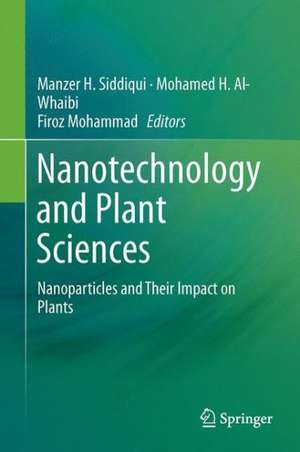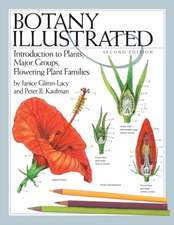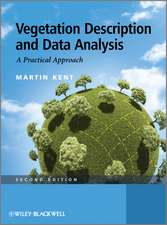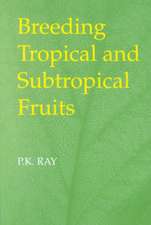Nanotechnology and Plant Sciences: Nanoparticles and Their Impact on Plants
Editat de Manzer H. Siddiqui, Mohamed H. Al-Whaibi, Firoz Mohammaden Limba Engleză Hardback – 9 feb 2015
In the 21st century, nanotechnology has become a rapidly emerging branch of science. In the world of physical sciences, nanotechnological tools have been exploited for a broad range of applications. In recent years, nanoparticles have also proven useful in several branches of the life sciences. In particular, nanotechnology has been employed in drug delivery and related applications in medicine.
| Toate formatele și edițiile | Preț | Express |
|---|---|---|
| Paperback (1) | 945.47 lei 6-8 săpt. | |
| Springer International Publishing – 6 oct 2016 | 945.47 lei 6-8 săpt. | |
| Hardback (1) | 951.47 lei 6-8 săpt. | |
| Springer International Publishing – 9 feb 2015 | 951.47 lei 6-8 săpt. |
Preț: 951.47 lei
Preț vechi: 1160.32 lei
-18% Nou
Puncte Express: 1427
Preț estimativ în valută:
182.09€ • 189.40$ • 150.32£
182.09€ • 189.40$ • 150.32£
Carte tipărită la comandă
Livrare economică 12-26 aprilie
Preluare comenzi: 021 569.72.76
Specificații
ISBN-13: 9783319145013
ISBN-10: 3319145010
Pagini: 303
Ilustrații: XII, 303 p. 39 illus., 23 illus. in color.
Dimensiuni: 155 x 235 x 22 mm
Greutate: 0.62 kg
Ediția:2015
Editura: Springer International Publishing
Colecția Springer
Locul publicării:Cham, Switzerland
ISBN-10: 3319145010
Pagini: 303
Ilustrații: XII, 303 p. 39 illus., 23 illus. in color.
Dimensiuni: 155 x 235 x 22 mm
Greutate: 0.62 kg
Ediția:2015
Editura: Springer International Publishing
Colecția Springer
Locul publicării:Cham, Switzerland
Public țintă
ResearchCuprins
Chemistry, Biochemistry of Nanoparticles and Their Role in Antioxidant Defense System in Plants.- Role of Nanoparticles in Plants.- Implications of Nanotechnology on Plant Productivity and Its Rhizospheric Environment.- Nanoparticles in Sustainable Agricultural Crop Production: Applications and Perspectives.- Interactions Between Engineered Nanomaterials and Plants: Phytotoxicity, Uptake, Translocation, and Biotransformation.- Toxicity of Nanomaterials to Plants.- Latest Developments of Nanotoxicology in Plants.- Early Developmental Responses of Plants Exposed to Metals and Oxides Nanomaterials.- Abiotic Stress Tolerant Transgenic Plants and Nanotechnology.- Carbon Nanotubes and Modern Nano-Agriculture.- Phytosynthesis of Nanoparticles.- Phytosynthesis of Metal Nanoparticles.- Plant Based Synthesis of Silver Nanoparticles and Their Characterization.- Nanoparticles Applied to Plant Mass Spectrometry Metabolomics.
Recenzii
“‘The students and researchers of plant molecular biology, plant physiology, agriculture, botany, biochemistry, biotechnology, environmental biology, microbiology, and forestry will be hugely benefitted by the contents of this book as it provides basic understanding of the interactions of NPs in plant system’. The book is also useful to NGOs dealing with civic problems caused by rapid environmental degradation.” (Mansi Bakshi, H. B. Singh and P. C. Abhilash, Journal of Cleaner Production, Vol. 113, 2016)
Textul de pe ultima copertă
This book presents a holistic view of the complex and dynamic responses of plants to nanoparticles, the signal transduction mechanisms involved, and the regulation of gene expression. Further, it addresses the phytosynthesis of nanoparticles, the role of nanoparticles in the antioxidant systems of plants and agriculture, the beneficial and harmful effects of nanoparticles on plants, and the application of nanoparticles and nanotubes to mass spectrometry, aiming ultimately at an analysis of the metabolomics of plants. The growing numbers of inventions in the field of nanotechnology are producing novel applications in the fields of biotechnology and agriculture. Nanoparticles have received much attention because of the unique physico-chemical properties of these compounds. In the life sciences, nanoparticles are used as “smart” delivery systems, prompting the Nobel Prize winner P. Ehrlich to refer to these compounds as “magic bullets.” Nanoparticles also play an important role in agriculture as compound fertilizers and nano-pesticides, acting as chemical delivery agents that target molecules to specific cellular organelles in plants. The influence of nanoparticles on plant growth and development, however, remains to be investigated. Lastly, this book reveals the research gaps that must be bridged in the years to come in order to achieve larger goals concerning the applications of nanotechnology in the plants sciences.
In the 21st century, nanotechnology has become a rapidly emerging branch of science. In the world of physical sciences, nanotechnological tools have been exploited for a broad range of applications. In recent years, nanoparticles have also proven useful in several branches of the life sciences. In particular, nanotechnology has been employed in drug delivery and related applications in medicine.
In the 21st century, nanotechnology has become a rapidly emerging branch of science. In the world of physical sciences, nanotechnological tools have been exploited for a broad range of applications. In recent years, nanoparticles have also proven useful in several branches of the life sciences. In particular, nanotechnology has been employed in drug delivery and related applications in medicine.
Caracteristici
Presents up-to-date knowledge on nanoparticles and their influence on plants Explains mechanisms involved in plant responses to nanoparticles Provides a balanced view on the possible positive and negative roles of nanotechnology in plant science Includes supplementary material: sn.pub/extras





